On the 23rd December 2006, we celebrated our 120 Year Anniversary with a special programme. Here is the dialogue from the service that explains our church history here at Kettering Seventh-day Adventist church.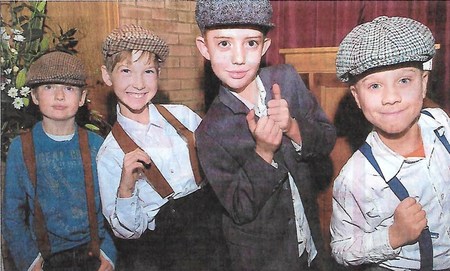
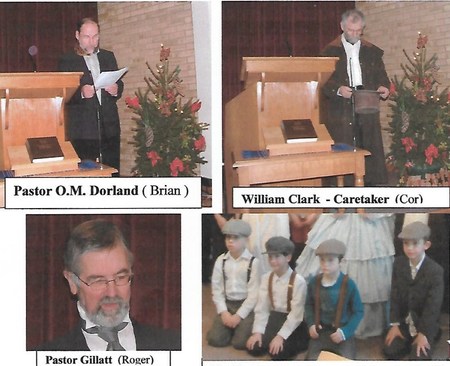
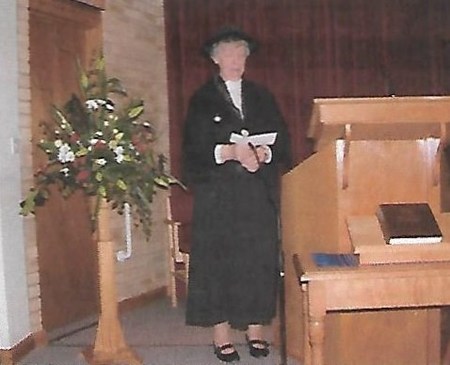
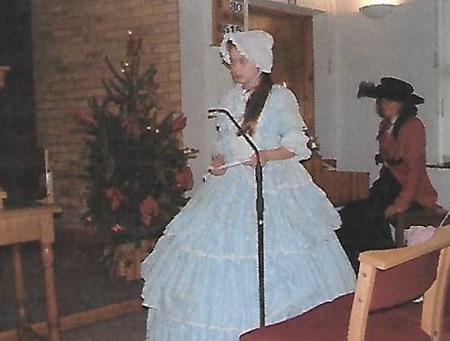
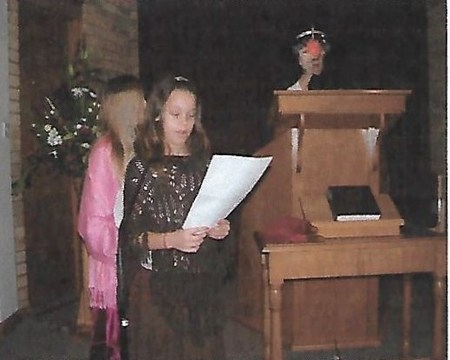
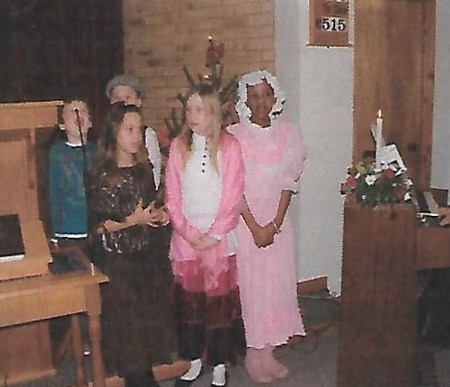
Narrator
The records of the church clerk state that the Kettering SDA Church was officially organised on December 18th 1886 with a membership of 17. But how did it begin?
Jeni
In 1882 and 1883 tent meetings were conducted in Riseley (near Bedford) and my friend and I sold books and magazines to support that work.
Glenys
When the meetings ended we moved on to Kettering and began selling papers and magazines like Present Truth.
Jeni
We did quite well, selling several hundred of them and scores of people took regular subscriptions to Present Truth.
Glenys
We also conducted some Bible studies with interested people. In December 1885, when Elder John Durland came from the USA, he visited one of our new customers who had begun to keep Sabbath.
Brenda
I became interested in sharing the message in the Present Truth magazines with others and sold over 30 each month. Elder Durland conducted meetings in my home attended by 13 interested people, and we urged him to conduct a series of meetings here in Kettering.
Durland
I began meetings in March 1886 in a rented hall in Kettering and had a good number attending. Never in England have I been welcomed with such a friendly spirit. When the hall was not available, I was invited to speak in the Methodist Hall, the first time such an invitation has been given since I came to England. After about 6 weeks of meetings, 4 ladies had "embraced the truth" and 7 more signed a covenant to keep the commandments, so when the weather became warmer we pitched a large tent beside the main street and my colleague Elder Lane and I began a series of meetings.
As well as preaching, we printed papers telling about our message and handing them out to people on Sundays as they went home from their churches. We conducted Sabbath meetings in the homes of interested people as well as in the tent.
Narrator
Another feature of these meetings was the testimonies given by members of the congregations who told of their experiences after listening to the preaching .
Testimony 1
I thank the Lord that I met Seventh-day Adventists and their publications; by hearing and reading I have been convinced of the truth. I could find no rest or peace of mind until I promised the Lord in solemn prayer that I would obey him by keeping the Sabbath and living out the truth, even in the face of loss of friends, position, and employment. I thank the Lord for the tent meetings. I have fully embraced the truth.
Testimony 2
For the past ten years I preached in the village near here. Since I have heard you preach and read your books I have learned more about the Bible than in the thirty five years of my Christian experience. I am convinced on most points of the faith, and as soon as I am fully convinced, I have made up my mind to embrace it, regardless of friends or business.
Testimony 3
I was excommunicated from the Methodist church for believing in the non-immortality of the soul; I stood almost alone in that truth and thought I had nearly all the truth until I heard you preach. I would like to keep the Sabbath, but it is hard to see how I can manage it.
Narrator
During the late summer and autumn, regular meetings were established to conduct Sabbath School and the evangelists wrote to the General Conference that they expected to organise the church "in a few weeks". Eventually, on December 18th 1886, the church was officially recognised and officers were chosen. An elder and deacon were ordained and a tract society organised with the person running it given the title of Librarian, since books and magazines were loaned as well as sold by the Tract Society. The editor of the local newspaper, who attended some of the meetings informed his readers that “the new denomination is making some headway here" .Some meetings were also held in Rushden and Rothwell but the response was poor and they did not feel justified in incurring the expense of continuing their efforts.
Narrator
Although the church had been formally established in Kettering its development was not easy. Evangelists stayed in the area for just few weeks, and the little group had to organise themselves. This presented some problems.
Young Father
I am convinced that the seventh-day Sabbath is the truth, and I want to keep it, but I have a wife and children to provide for. If l lose my job my family faces starvation, for work is hard to find in this area for everyone, and no employer would take on someone not prepared to do a full 6 days’ work in the week. I would like to obey, but I do not see how I can?
Ellen White
I found on my visits to England that some of the individuals had not been given thorough and practical instruction in how they should conduct their lives. There are some in Kettering who are undisciplined and self-important. They need a clear and well-defined view of Jesus, His self-denial, His self-sacrifice and His Holy mission. I am concerned for the members in Kettering as they are left much of the time without a minister. It is the duty of those who are connected with the church to do their utmost to strengthen it and make the meetings so interesting that non-believers will be attracted. Avoid long oratorial prayers that kill the interest of the meetings and made them tedious. Do not devote long time to sermonising and talk words for the sake of talking and killing time.
Narrator
The church clearly had some problems to solve and during the next few years the church records give an indication of bow the various personalities had to learn to work together. Remembering that in the late 1800's there was a very rigid code of behaviour , it is not surprising that there were records of members being "censured" and even behaving in a way ''which has brought odium upon the truth and a disgrace upon the church".
The atmosphere in which the church developed is shown by the introduction to a book of carols published in about 1900 which states:
"The object of this collection of carols is to provide a choice of carols, both old and new that may be suitable to modern taste; but to exclude any reference to dangerous traditions and extravagant fables. Use has only been made of those words which seem most likely to bring home to one the simple Biblical story of our Saviour's birth."
Nevertheless, by 1896 it is recorded that the Temperance Hall in Gold Street was rented and 6 people attended for the first time and decided to obey the Lord and keep His commandments. In June 1896, 21 candidates were baptized in the Fuller Chapel which was kindly lent for the occasion.
William Clark
In January 1899 we moved into a new hall in York Road, rented to us by one of our members. I was appointed caretaker and my duties were to open the hall, keep it clean, attend to fires and take care of books and other property at a salary of 2 shillings per week. The children were allowed to use the back staircase to give access to their room. I resigned in July 1899 and Alice Baldwin took my place.
Amy
My name is Ada Baldwin and I attend the Kettering SDA church school, the very first school to be started by a church in England. We have a very good teacher and we learn lots of useful and interesting subjects. I like to do reading and writing and spelling, but my favourite subject is Geography. It is very exciting to learn about other countries and it makes me want to go and see them for myself. When I grow up, I would like to train to be a nurse and I would like to go to Africa
Anna
I am Ada's sister Connie and I go to the church school too. I like learning the Bible stories, and I am interested in finding out about my own country. Maybe when I grow up I can help to tell people in this country about the good news of Jesus coming again.
Amy
We do lots of singing in school and now we are asking some of the others in the school to come and sing a carol with us. It was written in German, but we are going to sing English words.
Anna
Sadly the school had to close as there were too few children, but we enjoyed our time there.
Narrator
The York Road hall proved expensive for the members to rent as it is recorded that many of their number had moved out of the town. There was a debt of £9 owing for rent but the landlord agreed to take the furnishings and sell them in payment of the debt. However, meetings continued in York Road until a bold suggestion was made in 1909.
WHJessop
I proposed that we build a place of our own, on the land which we acquired some years ago at the comer of Club Street and Canon Street. I undertook to do the work for an estimate of £120 if the church agreed. We had to find a place for the furnishings so some members found spaces in their homes and I offered to build a shed on the building plot so the rest could be stored without trouble. The work was completed within budget and decorated and furnished at a cost which the members pledged to pay for, though there was little spare cash around in those hard times. The new church was opened on July 21st 1909, but there was still no resident minister and only occasional visiting preachers, some of whom were also laymen.
Narrator
For a number of years the stalwart group of believers worked very hard to spread the gospel message in the Kettering area. They held public meetings on Sundays in Kettering, Desborough, Market Harborough and other districts as well as mid-week prayer meetings, all day Sabbath meetings and business meetings at least once a month. They were always concerned about finances, yet they gave of the little they had to support those in greater need. They also looked to the wider work of the church and sent delegates to conference sessions and young people to special gatherings.
Pastor Gillatt
I visited the Kettering church about once a quarter and also gave them advice when they required some help in solving local problems. The faithful group of men and women continued to conduct services throughout the World War 1914-18 and expressed concern for those who had suffered imprisonment because of their refusal to carry arms or work on the Sabbath. They were always eager to help where there was a need and found time for projects such as selling waste paper to raise money for bed-linen and crockery for Stanborough College in Watford.
By the early 1920's we were able to support Kettering by sending more visiting ministers and the Bible worker from Northampton took meetings for them once or twice a month.
AK Armstrong
In 1927 I moved into the Northampton area and was therefore able to give more regular support to the church in Kettering and also conduct some public meetings in the town. However, I had to move after only a couple of years, leaving the laymen and women to continue their valiant work.
Narrator
The 1930's was known nationally and internationally as the time of the “depression" when many people were suffering severe hardship. However, at this time an increase in attendance was reported and a need for more communion glasses. Names such as Reg Anderson, Agnes Abbott and Brother Barber appeared in the church records. There was also concern for the young people and the necessity of ensuring that something was done to interest them. New books were bought for the library and the ground beside the church could be used for games -but only certain approved ones!
Pastor OM Dorland
As President of the Conference in the late 1930s, I visited Kettering several times each year and was very encouraged by the faithful way in which the members organised the church and found many ways of reaching the local people. It was also good to see the young people taking an active part in the church and I encouraged ministers and teachers from Newbold College (near Rugby) to visit this church as often as possible. Several of their young people have gone to the college to study and prepare for service in the church. They also have a lively interest in overseas missions as several of the members, such as Ada and Harry Robson have now served in East Africa for about 15 years and are planning to continue their work, even if war should come.
Narrator
The church was licensed for marriages in 1943 and Agnes and Karl Ohman were married there on May 22nd by Pastor Lennox, who appears to be residing in the area with his family- since it is reported that Billy Lennox would take care of the fires! Through the 6 years of World War II 1939-45 the church continued to hold Sabbath, Sunday and mid-week services in spite of the blackout and the threat of air-raids.
2nd Narrator
The years from the end of the war to the present are too eventful to be treated lightly, so we will record them at a later date. But to show how time had passed, let us follow the stories of the 2 little girls -Ada and Connie Baldwin.
Connie married a minister, Alfred Bird, and the worked in many churches, including Kettering. They had 2 daughters, Rowena -who married a teacher Wilfred Futcher and now lives in America, and Romola, wife of Brian Combridge. Their daughter Melinda (granddaughter of Connie Baldwin) was at school with Debbie, Jeni, Sarah etc.
Ada also married a minister, Harry Robson, and they worked in East Africa for over 32 years, returning in 1957 to give many years of service to the Kettering church. They had no children of their own, but thanks to Ada's nursing skills many African mothers and babies have lived and worked to spread the gospel message. Ada had a long and eventful life and a very good memory- she died only 7 years ago at the age of 106 in the nursing home run by Colleen. Her life story deserves its own place in our church's history.
Down through the years the Kettering church has set an example of Christian witness, hospitality and care for others. The members were human, with failings and problems like the rest of us, but we would like to feel that we are all part of this great inheritance that has been given us.
NEWSPAPER ARTICLE
THE daughter of one of the founding members of a local church helped celebrate its 120th anniversary.
Dozens of people dressed as Victorians to celebrate the 120th anniversary of the Seventh Day Adventist Church in Canon Street, Kettering on Saturday.
The Seventh Adventist Church was established in America and the Kettering church, which was founded in 1886, was the third church of the denomination to be formed in the UK.
Originally, there were 17 members who met in rented halls in Kettering until the church was built in 1909. Church elder Tony Welsh said: "Around 60 people took part in the celebrations on Saturday, which included carol singing and re-enactments from history.
It was nice to have Joan Jessop in the congregation. She is 93 and the daughter of one of the founding members, who donated land for the church. We currently have 60 members who meet every Saturday for a Bible study group at 10am followed by a service at 11am.”
